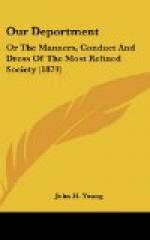The invitation to a large party is similar to that for a ball, only the words “at a ball” are omitted, and the hour may be earlier. The notes of acceptance and regret are the same as for a ball. If the party is a small one, it should be indicated by inserting the words, “to a small evening party,” so that there may be no misunderstanding. A large party calls for full evening dress, and it would be embarrassing for a lady or gentleman to go to a house in full evening dress, expecting to find a large party there in similar costumes, and meet only a few friends and acquaintances plainly dressed. If there is any special feature which is to give character to the evening, it is best to mention this fact in the note of invitation. Thus the words “musical party,” “to take part in dramatic readings,” “amateur theatricals,” will denote the character of the evening’s entertainment. If you have programmes, enclose one in the invitation.
INVITATION TO A PUBLIC ENTERTAINMENT.
An invitation from a gentleman to a lady to attend a concert, lecture, theatre, opera or other amusement, may read as follows:
“Mr. Hayden would be pleased to have Miss Morton’s company to the Academy of Music, on Monday evening, November 8, when ‘Richelieu’ will be played by Edwin Booth’s Company.”
An invitation of this kind demands an immediate answer of acceptance or regrets. A previous engagement may be a reason for rejection.
DINNER INVITATIONS.
These are written in the name of the husband and wife, and demand an immediate reply. This form may be used:
“Mr.
and Mrs. Eugene Snow request the pleasure of
Mr.
and Mrs. Horace Allen’s company at dinner, on
Tuesday,
the 13th of January, at 7 o’clock.”
A note of acceptance may read as follows:
“Mr. and Mrs. Horace Allen accept with pleasure Mr. and Mrs. Eugene Snow’s kind invitation to dine with them on Tuesday, the 13th inst., at 7 o’clock.”
A note of regret may read:
“Mr. and Mrs. Horace Allen regret exceedingly that sickness in the family (or whatever the cause may be) prevents the acceptance of Mr. and Mrs. Eugene Snow’s kind invitation to dine with them on Tuesday, January 13th.”
INVITATIONS TO TEA.
An invitation to a tea-drinking may be less formal and should partake more of the nature of a private note; thus:
“Dear Miss Brock: Some friends are coming to drink tea with me on Thursday, and I should be glad of the pleasure of your company also. Please do not disappoint me.”
An invitation of this informal nature needs no reply, unless “R.S.V.P.” is appended, in which case the answer must be returned, if possible, by the messenger who brought it, or sent at once, as your friend may depend upon having a certain number of people at her tea-drinking, and if you cannot go, she will want to supply your place.




